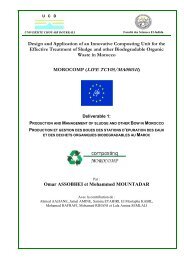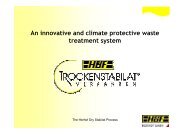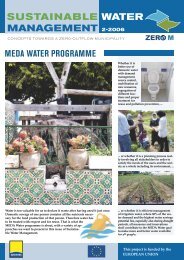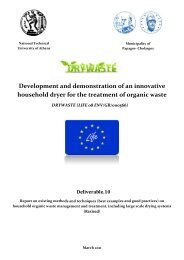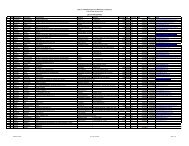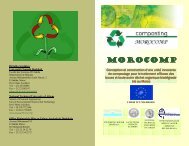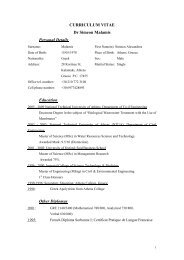MOROCOMP (LIFE TCY05/MA000141) - Unit of Environmental ...
MOROCOMP (LIFE TCY05/MA000141) - Unit of Environmental ...
MOROCOMP (LIFE TCY05/MA000141) - Unit of Environmental ...
Create successful ePaper yourself
Turn your PDF publications into a flip-book with our unique Google optimized e-Paper software.
above 70 o C due to insulation effects and on-going microbial activity. At these<br />
temperatures many micro-organisms die or become dormant and the process<br />
effectively stops until the micro-organisms can recover. Turning or aerating the<br />
substrate when it approaches 60 o C can prevent this. If thermal kill does occur, the<br />
substrate should be re-mixed using material from biologically active batches.<br />
2.7. Retention time<br />
The time period required to produce a composted organic material depends on many<br />
factors, including user needs, moisture, temperature and the used raw materials.<br />
Factors, which may slow the process down, include a high C:N ratio, low<br />
temperature, insufficient aeration, lack <strong>of</strong> moisture, large particles and high<br />
percentages <strong>of</strong> resistant materials such as wood. If the composted organic material<br />
does not need to be completely stable for specific agricultural or biological<br />
applications, it can be matured and finished where it is applied to land. The<br />
composting period is <strong>of</strong>ten extended for composted organic products, which need to<br />
be stable or particularly dry.<br />
3. The need for sludge and BOW composting<br />
The main objective <strong>of</strong> <strong>MOROCOMP</strong> project is to develop and establish an innovative<br />
composting system for the treatment and reuse <strong>of</strong> sludge and other biodegradable<br />
organic waste (BOW). The environmentally sound and commercially feasible<br />
management <strong>of</strong> sewage sludge is a major issue that all European countries confront.<br />
Sewage sludge arises from the processes <strong>of</strong> wastewater treatment and represents one<br />
<strong>of</strong> the top priority waste streams. The most important reason that sludge generation,<br />
disposal and recycling has been <strong>of</strong> particular concern lies in the fact that pollutants<br />
contained in sewage sludge may impose potential risks on human health and on the<br />
environment when applied to agricultural land without controlling its qualitative and<br />
quantitative characteristics.<br />
The selected substrate that was used as feedstock material into the bioreactor<br />
comprised <strong>of</strong> primary sludge, green waste and manure <strong>of</strong> different origin (sheep,<br />
cow). Sewage sludge was selected to be the primary raw composting material since<br />
16



